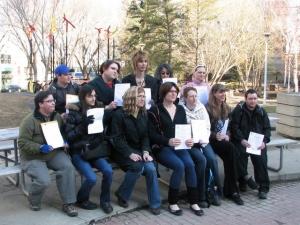Across Alberta last week trans activists and allies continued to pressure the Alberta government to relist gender reassignment surgery (GRS), after the province announced it was cutting the program to save money.
The actions started at the Alberta legislature during question period on Apr 14, where over 30 activists and allies were on hand to support the opposition’s questioning of Health Minister Ron Liepert.
“The health minister wants to cut gender reassignment,” stated NDP MLA Rachel Notley in question period. “He seems to think that he can create a political precedent for delisting by going after people and services that are most vulnerable; for instance, where there is a high level of public misunderstanding, as with gender reassignment surgery.”
Earlier in question period, Liberal MLA Laurie Blakeman asked Minister Liepert to “explain the medical reasons why gender reassignment surgery was delisted and why there was a complete lack of consultation with any medical professionals with expertise in this field.”
“This was not based on medical decisions,” Liepert responded. “This was based on a number of programs.” His response was met with vocal outcry and interruptions from other MLAs.
The next day, activists held a simultaneous mass human rights filing in both Edmonton and Calgary. Twenty-five trans folk individually filed human rights complaints against the Alberta government. “It appears as though we were singled out,” says activist Mercedes Allen, who was among those that filed a complaint. Allen is four years into her gender reassignment process. “GRS is a necessity and the trans community was not even consulted.”
Due to the backlash, the Alberta government has had to take a step back. They have now said that they will form an advisory committee to look at which services should be delisted. Aside from GRS the government is considering delisting some chiropractic and suicide prevention services as well as those affecting aboriginals and seniors. It is not clear if they are officially reconsidering relisting the GRS program.
During the Apr 14 question period, Liepart said the government intends on “funding to completion” the “some 26 individuals who are currently in the program (GRS).” He also said the province would cover the cost of the “some 20 individuals that have been prescribed certain drugs by the medical profession but not approved for funding by government.”
This news came as a small relief to the trans community, but it is also causing confusion. Many trans folks are left wondering if they are among the 46 that will be grandfathered. No official list has been released and information on who will be covered is hard to come by. Activist Michelle Drinkwater, who is eager to find out if she is on the list, says 46 seems like a low number of people “in the program” since she is aware of many more who have recently begun hormone therapy in Alberta.
According to the government, cutting gender reassignment surgery will save the province $700,000 a year — the equivalent of around 16 surgeries a year. Activists say that amounts to a savings of only 19 cents per Albertan.
“That money [the government says they will save] is a teardrop when you consider the billion dollar budget the Alberta government is dealing with, ” says Drinkwater. She adds that the government is failing to consider the fallout healthcare costs associated with people who need the surgery but cannot afford it. She lists costs associated with treating depression and lack of productivity in the work force.
Drinkwater notes that most private health care insurance companies will not cover GRS, so if the government does not relist the surgery, those who need it will be left with few options. Some may choose to move to provinces like Ontario, where the government relisted GRS last year after the program was cut a decade ago. Others will attempt to pay for the surgeries themselves — a daunting task considering male to female surgeries can cost upwards of $20,000 and female to male surgeries can cost approximately $70,000.
The delisting of GRS came a week after the Alberta government announced that they will add sexual orientation to the province’s human rights act, 10 years after the Supreme Court ruled that they must do so. Trans activists hoped that by the time Alberta formally recognized sexual orientation in the act that gender identity would also be included, but the government’s announcement appears to have shot down that hope. Activists argue this puts members of the trans community at greater vulnerability for issues around housing, employment and safety.
Allies have been speaking up across the country. In an Apr 17 press release, the Public Service Alliance of Canada stated that Alberta should “reverse its decision on gender surgery. Public access to medically necessary health care is a human right.” The statement goes on to denounce “the Alberta government for delisting sex reassignment surgery from its provincial health plan and urges Health Minister Ron Liepert to reinstate funding immediately.”
In the face of support, confusion and uncertainty, trans activists continue their struggle. “We are going to keep fighting until GRS is relisted,” promises Drinkwater.
For more info, join the Facebook group:
Reinstate Gender Reassignment Surgery Funding in Alberta

 Why you can trust Xtra
Why you can trust Xtra


